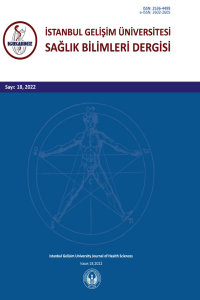Evaluation of Spleen Stiffness Using Point Shear Wave Elastography in Healthy Individuals
Öz
Anahtar Kelimeler
Kaynakça
- Shiina T, Nightingale KR, Palmeri ML, et al. WFUMB guidelines and recommendations for clinical use of ultrasound elastography: Part 1: Basic principles and terminology. Ultrasound Med Biol. 2015;41:126–47.
- Süha Süreyya Özbek. Liver elastography. Trd Sem. 2019;7:13–24
- Cosgrove D, Barr R, Bojunga J, et al. WFUMB guidelines and recommendations on the clinical use of ultrasound elastography: Part 4. Thyroid. Ultrasound Med Biol. 2017;43:4–26.
- Leung VY, Shen J, Wong VW, et al. Quantitative elastography of liver fibrosis and spleen stiffness in chronic hepatitis B carriers: Comparison of shear-wave elastography and transient elastography with liver biopsy correlation. Radiology. 2013;269:910–918.
- Zaleska-Dorobisz U, Pawluś A, Szymańska K, Łasecki M, Ziajkiewicz M. Ultrasound elastography: Review of techniques and its clinical applications in pediatrics. Part 2. Adv Clin Exp Med. 2015;24:725–730.
- Paluch Ł, Nawrocka-Laskus E, Wieczorek J, Mruk B, Frel M, Walecki J. Use of ultrasound elastography in the assessment of the musculoskeletal system. Pol J Radiol. 2016;81:240–246.
- Arda K, Ciledag N, Aktas E, Aribas BK, Köse K. Quantitative assessment of normal soft-tissue elasticity using shear-wave ultrasound elastography. AJR Am J Roentgenol. 2011;197:532–536.
- Pawluś A, Inglot MS, Szymańska K, et al. Shear wave elastography of the spleen: Evaluation of spleen stiffness in healthy volunteers. Abdom Radiol (NY). 2016;41:2169–2174.
- Rafał Mazur, Milena Celmer, Jurand Silicki, Daniel Hołownia, Patryk Pozowski, Krzysztof Międzybrodzki. Clinical applications of spleen ultrasound elastography – a review. J Ultrason. 2018;18:37–41.
- Mauro Giuffrè, Daniele Macor, Flora Masutti, et al. Evaluation of spleen stiffness in healthy volunteers using point shear wave elastography. Annals of Hepatology. Sep-Oct 2019;18(5):736-741. doi: 10.1016/j.aohep.2019.03.004.
- Giovanna Ferraioli, Carmine Tinelli, Raffaella Lissandrin, et al. Ultrasound point shear wave elastography assessment of liver and spleen stiffness: Effect of training on repeatability of measurements. Eur Radiol. 2014;24(6):1283-9. doi:10.1007/s00330-014-3140-y.
- Cho YS, Lim S, Kim Y, et al. Spleen stiffness measurement using 2-dimensional shear wave elastography: The predictors of measurability and the normal spleen stiffness value. J Ultrasound Med. 2019;38(2):423–431.
- Procopet B, Berzigotti A, Abraldes JG, et al. Real-time shear-wave elastography: Applicability, reliability and accuracy for clinically significant portal hypertension. J Hepatol. 2015;62(5):1068–1075.
- Karlas T, Lindner F, Tröltzsch M, et al. Assessment of spleen stiffness using acoustic radiation force impulse imaging (ARFI): Definition of examination standards and impact of breathing maneuvers. Ultra-schall Med. 2014;35:38–43.
- Kassym L, Nounou MA, Zhumadilova Z, et al. New combined parameter of liver and splenic stiffness as determined by elastography in healthy volunteers. Saudi J Gastroenterol. 2016;22:324-30.
- Albayrak E, Server S. The relationship of spleen stifness value measured by shear wave elastography with age, gender, and spleen size in healthy volunteers. Journal of Medical Ultrasonic. 2019;46(2):195-199. doi: 10.1007/s10396-019-00929-3.
Sağlıklı Bireylerde Dalak Sertliğinin Point Shear Wave Elastografi ile Değerlendirilmesi
Öz
Anahtar Kelimeler
Dalak sertlik nokta kayma dalgası elastografi Spleen stiffness point shear wave elastography
Kaynakça
- Shiina T, Nightingale KR, Palmeri ML, et al. WFUMB guidelines and recommendations for clinical use of ultrasound elastography: Part 1: Basic principles and terminology. Ultrasound Med Biol. 2015;41:126–47.
- Süha Süreyya Özbek. Liver elastography. Trd Sem. 2019;7:13–24
- Cosgrove D, Barr R, Bojunga J, et al. WFUMB guidelines and recommendations on the clinical use of ultrasound elastography: Part 4. Thyroid. Ultrasound Med Biol. 2017;43:4–26.
- Leung VY, Shen J, Wong VW, et al. Quantitative elastography of liver fibrosis and spleen stiffness in chronic hepatitis B carriers: Comparison of shear-wave elastography and transient elastography with liver biopsy correlation. Radiology. 2013;269:910–918.
- Zaleska-Dorobisz U, Pawluś A, Szymańska K, Łasecki M, Ziajkiewicz M. Ultrasound elastography: Review of techniques and its clinical applications in pediatrics. Part 2. Adv Clin Exp Med. 2015;24:725–730.
- Paluch Ł, Nawrocka-Laskus E, Wieczorek J, Mruk B, Frel M, Walecki J. Use of ultrasound elastography in the assessment of the musculoskeletal system. Pol J Radiol. 2016;81:240–246.
- Arda K, Ciledag N, Aktas E, Aribas BK, Köse K. Quantitative assessment of normal soft-tissue elasticity using shear-wave ultrasound elastography. AJR Am J Roentgenol. 2011;197:532–536.
- Pawluś A, Inglot MS, Szymańska K, et al. Shear wave elastography of the spleen: Evaluation of spleen stiffness in healthy volunteers. Abdom Radiol (NY). 2016;41:2169–2174.
- Rafał Mazur, Milena Celmer, Jurand Silicki, Daniel Hołownia, Patryk Pozowski, Krzysztof Międzybrodzki. Clinical applications of spleen ultrasound elastography – a review. J Ultrason. 2018;18:37–41.
- Mauro Giuffrè, Daniele Macor, Flora Masutti, et al. Evaluation of spleen stiffness in healthy volunteers using point shear wave elastography. Annals of Hepatology. Sep-Oct 2019;18(5):736-741. doi: 10.1016/j.aohep.2019.03.004.
- Giovanna Ferraioli, Carmine Tinelli, Raffaella Lissandrin, et al. Ultrasound point shear wave elastography assessment of liver and spleen stiffness: Effect of training on repeatability of measurements. Eur Radiol. 2014;24(6):1283-9. doi:10.1007/s00330-014-3140-y.
- Cho YS, Lim S, Kim Y, et al. Spleen stiffness measurement using 2-dimensional shear wave elastography: The predictors of measurability and the normal spleen stiffness value. J Ultrasound Med. 2019;38(2):423–431.
- Procopet B, Berzigotti A, Abraldes JG, et al. Real-time shear-wave elastography: Applicability, reliability and accuracy for clinically significant portal hypertension. J Hepatol. 2015;62(5):1068–1075.
- Karlas T, Lindner F, Tröltzsch M, et al. Assessment of spleen stiffness using acoustic radiation force impulse imaging (ARFI): Definition of examination standards and impact of breathing maneuvers. Ultra-schall Med. 2014;35:38–43.
- Kassym L, Nounou MA, Zhumadilova Z, et al. New combined parameter of liver and splenic stiffness as determined by elastography in healthy volunteers. Saudi J Gastroenterol. 2016;22:324-30.
- Albayrak E, Server S. The relationship of spleen stifness value measured by shear wave elastography with age, gender, and spleen size in healthy volunteers. Journal of Medical Ultrasonic. 2019;46(2):195-199. doi: 10.1007/s10396-019-00929-3.
Ayrıntılar
| Birincil Dil | İngilizce |
|---|---|
| Konular | Klinik Tıp Bilimleri |
| Bölüm | Makaleler |
| Yazarlar | |
| Yayımlanma Tarihi | 31 Aralık 2022 |
| Kabul Tarihi | 16 Aralık 2022 |
| Yayımlandığı Sayı | Yıl 2022 Sayı: 18 |
![]() Alıntı-Gayriticari-Türetilemez 4.0 Uluslararası (CC BY-NC-ND 4.0)
Alıntı-Gayriticari-Türetilemez 4.0 Uluslararası (CC BY-NC-ND 4.0)

